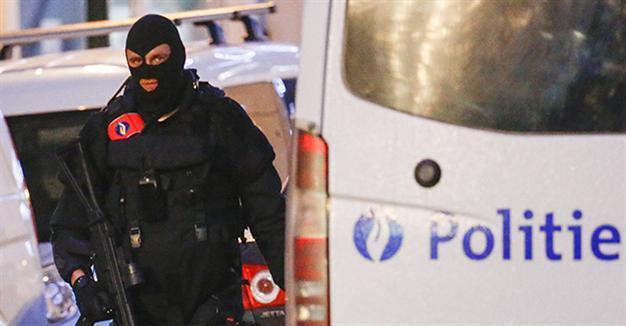Belgian police find Paris fugitive's fingerprint, belts in flat
BRUSSELS - Agence France-Presse

A Belgian special forces police officer patrols a street during a police raid in central Brussels, Belgium, December 20, 2015, which, according to Belgian media, is in connection with last month's deadly Paris attack. REUTERS/Yves Herman
Belgian police have found three belts for possible use in suicide attacks, traces of explosives and a fingerprint of wanted Paris attacks suspect Salah Abdeslam at a Brussels flat, prosecutors said Jan. 8.
Prosecutors said Abdeslam might have hidden in the flat after the November 13 attacks, but that they were also working on the theory that the explosive devices used in the massacre could have been made there.
The discovery was made in December during a search of an apartment in the Schaerbeek area of the Belgian capital. It was rented by someone using a false name, possibly used by another suspect now in custody, they said.
"In the framework of the investigation opened after the Paris attacks the federal prosecutor confirms that during a house search conducted December 10th in an apartment on the third floor, Rue Berg in Schaerbeek, material that can be used to fabricate explosives as well as traces of TATP were found," the prosecutor said.
"This apartment was rented under a false identity that might have been used by a person already in custody in this case," the statement added.
"Three handmade belts that might be used to transport explosives as well as a fingerprint of Salah Abdeslam were also discovered."
Police have been hunting for Belgian-born Abdeslam, 26, since suicide bombers and assailants firing automatic weapons killed 130 people and wounded many more in a wave of attacks across Paris.
Investigators said friends drove Abdeslam from Paris back to the Belgian capital, slipping through three police checks, while one suspect has since said that he drove Abdeslam across Brussels to Schaerbeek on Nov. 14.
Federal prosecutors spokesman Eric Van Der Sypt said however that it was not clear when Abdeslam visited the Brussels apartment.
"We found the fingerprint but we have no idea when it was left -- a fingerprint has no date or time on it," Van Der Sypt told AFP.
"Maybe he went there to get his belt (before the attacks), and maybe he went back afterwards. I suppose it's a possibility of both," he added.
He would not comment on Belgian media reports that the flat had been cleaned and checked for fingerprints after the attacks, which would explain why only one of Abdeslam's prints was found.
After the attacks, French authorities said that telephone data had placed Abdeslam in the area where an explosives belt was found in a dustbin in the Paris suburb of Montrouge.
The Islamic State of Iraq and the Levant (ISIL) claimed responsibility for the coordinated series of attacks on bars, restaurants, and a concert hall, in which the attackers were armed with guns and suicide belts. Seven died during the assault but the total number of those directly involved is still unclear.
One of them was Abdeslam's brother, Brahim.
In early December, Belgian prosecutors said they were looking for two "armed and dangerous" men who used false ID papers to help Abdeslam travel to Hungary in Septemisber where he was stopped -- but then let go -- by police.
Belgian authorities have arrested and charged a total of 10 people in connection with the attacks, including several with helping Abdeslam.
France has long said the attacks were prepared and organised in Belgium and that the mastermind was Abdelhamid Abaaoud, a Brussels resident who was killed in a police raid in Paris days after the massacre.
